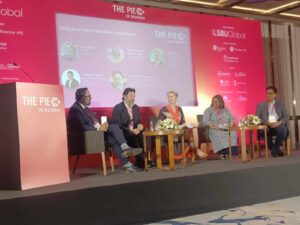UK higher education is constantly adapting, innovating and reshaping itself in response to the changing external context, giving the lie to the idea that what universities do hasn’t changed that much in 500 odd-years.
The university sector’s trajectory is one of continual evolution, recognising the social, economic and political needs of the time. As institutions, universities have proved to be remarkably resilient, surviving (and often thriving) through adaptation, innovation and strategic change. This is especially true when the financial outlook is tough. There’s no shortage of advice to universities: restructure; transform; diversify; grow. If every university in the country took that advice, higher education as we know it could look quite different in five years time.
There’s a version of change that looks mainly like individual institutions reacting in response to their own immediate challenges and perceptions of reality, creating a fragmented and disparate approach in which there are almost inevitably winners and losers. But the higher education sector has shown it has the capability to take part in the larger ongoing project of interrogating the political and policy environment, and institutional practices and cultures, and collectively developing and advancing ideas for change.
As the UK looks towards a General Election within the year, and a potential change in government in Westminster, there’s an opportunity to build a fresh story about what higher education is and why it matters for every citizen of the UK. But that requires anyone who thinks about and cares about higher education to be prepared to tackle the difficult questions as well as presenting the evidence in a compelling way to the public and to policymakers.
In November, once again we’re inviting you to join Wonkhe and the University of London at London’s iconic Senate House to debate the most pressing issues facing higher education, to hear fresh perspectives, to shape policy thinking, and to examine the latest trends, research and innovations. Over two action-packed days we’ll be tackling a whole host of existential questions – such as…
What will the incoming government want from higher education in its first term?
We’ve no idea whether there will be a new Westminster government by the time we gather in London in November, or whether we’ll be looking towards an imminent election – and while the polls are certainly indicating the prospect of a Labour majority, we’re not making any assumptions about the results. But whoever takes office will have a big basket of priorities, around productivity, skills, research and innovation, regional economies, and immigration. We’ll interrogate the opportunities for universities and colleges to re-establish higher education in the national policy narrative as a key contributor and delivery partner for national policy agendas – and the deals and trade-offs that might ensue.
Are we all “tertiary” now?
The appeal of the “tertiary” is in the prospect of a more coherent and consistent post-compulsory education offer, theoretically more attuned to the needs of regions and the country as a whole. Eyes will be on Wales, where the new Commission for Tertiary Education and Research will be flexing its regulatory muscles. In England, the Lifelong Learning Entitlement should (theoretically) facilitate a more flexible system across the whole of university and college-based higher education. But before embracing the notion of tertiary, it’s worth interrogating whose interests it serves, what its benefits and downsides are and how it can work in practice.
How can higher education be part of rebuilding equitable opportunity across the UK?
Those of us who work across higher education retain a deep belief in its power to transform lives. But we’re also attuned to the limits of university influence in conquering cultural prejudice and redressing systemic economic inequities, particularly as the UK continues to suffer from regional economic inequality and lagging productivity, exacerbated by the fallout from Brexit and the legacy of austerity. As students struggle with meeting the costs of study and with their mental health, and the value of university always seems to be a point of public debate, we’ll look again at the existing assumptions around what education opportunity means across the nations and regions of the UK and think through how higher education can continue to deliver it.
What kind of world are higher education institutions designing higher education for?
Chatham House chief executive Bronwen Maddox has called 2024 “the biggest election year in history.” With a Trump-Biden rematch in the US presidential election a week before the festival in November, ongoing conflict between Russia and Ukraine and in the Middle East, and tensions with China continuing to shape UK foreign policy, not to mention a strained relationship with the EU, universities seeking to work with government on international education and research will need to be sophisticated in their grip of international relations and knowledge diplomacy to avoid getting into financial or reputational hot water. At the Festival we’ll develop some plausible scenarios for the years ahead and think through how to walk the foreign policy tightrope.
What kind of leadership is needed to steward HE?
…And do we have it? The difficult decisions that institutional leaders and governors are making right now will determine the future shape and activity of the higher education sector including what courses are on offer, and what research is prioritised. Their ability to oversee change, build organisational capability, sustain external partnerships, and maintain the morale and motivation of their staff will determine whether the sector continues to thrive or whether it flounders in the years ahead. But equally important will be leadership of subject disciplines, students’ unions and professional service teams – we’ll assess whether the sector’s decision-makers have the right mix of skills, evidence, and values to make the best possible calls in challenging times.
What should the compact be between higher education institutions and their staff?
It is not at all clear that the way that work is organised in higher education right now serves the best interests of either institutions or the staff that work in them. But nor is it clear what a good alternative would be – or whether a different HE landscape or better adoption of technology could make a meaningful difference. We’ll get into thorny issues around workload, work-life balance, academic community, and the potential for emerging technologies to change the nature of university work for good, or ill.
What do universities need to research about themselves?
With a hat tip to our friend Andy Westwood…if universities spent three per cent of their own “Gross Domestic Product” on researching themselves, what new knowledge and insight might emerge? Uncertain times and tight budgets mean there’s a need for evidence of “what works” across universities’ core activity, as well as rigorous and robust interrogation of some of the existential questions that are shaping universities’ strategic plans. As well as sharing the latest data and insight from across the sector, we’ll be asking what a research agenda for higher education policy should look like – and how to bring that work to life.
These are just some of the big questions shaping our thinking as we put together the agenda for the Festival on 12-13 November – you can also expect to hear insight and ideas from speakers within and outside the higher education sector, from our Festival partners, and from each other, as we come together to assess the state that HE is in and what can be done about it. We can’t wait to see you there.
Find out more about the Festival of Higher Education and secure your ticket here.




